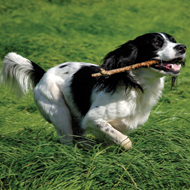Sticks could give dogs "horrific injures," BVA warns

Owners have been advised to "exert an element of caution" when picking a toy to play with.
British vets and animal charities are warning dog owners that they could give their pets "horrific injuries" by playing fetch with sticks.
Grace Webster, president of the Scottish BVA, spoke to The Times after a collie named Maya got a 10cm stick lodged in her throat.
"Throwing sticks for your dog can be very dangerous and lead to horrific injuries that can be very distressing for both you and your dog, such as causing cuts to their mouths and tongues or, as in this case, getting the stick lodged in their throat," she said.
"Even when the initial would is treated, splinters of wood have often got stuck and require subsequent operations."
Grace added that alternatives to sticks should be rubber sticks which can be purchased from pet shops, tennis balls and frisbees.
However, some dog owners have reacted to the comment with scepticism. Television presenter and labrador owner Ben Fogle commented on Twitter: "We've been warned not to throw sticks for our dogs to recent injury? I've thrown sticks for 35 hers without a problem. Have sticks changed?"
Following Grace Webster's comments, the Dogs Trust have issued a statement advising owners to "exert an element of caution" when picking a toy to play with.
They write: "Sticks might be readily available and seen as the most natural toy for a dog on a walk, but they do come with risks, and in some cases a greater eventual price tag than their plastic counterparts.
"Sticks can break and splinter which can prove particularly dangerous if it happens whilst the dog is chewing it. Similarly if a dog is jumping to catch a stick in its mouth, serious injuries can occur as the stick can become lodged in the oral cavity or throat.
"Dogs Trust would encourage owners to opt for a safer option such as frisbee or dog ball that can still guarantee the fun of playtime, but without any potential risk factor."



 The Veterinary Medicines Directorate (VMD) is inviting applications from veterinary students to attend a one-week extramural studies (EMS) placement in July 2026.
The Veterinary Medicines Directorate (VMD) is inviting applications from veterinary students to attend a one-week extramural studies (EMS) placement in July 2026.